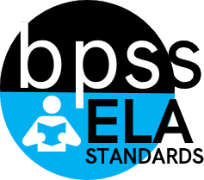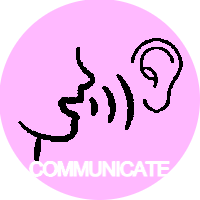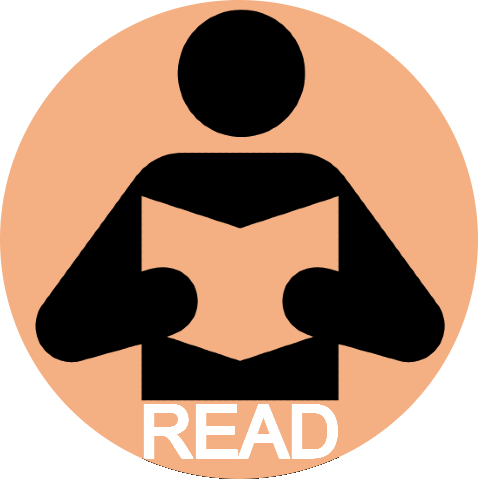*ELA-07.Wr  ELA-07.Wr ELA-07.Wr Strand  | (Wr) Writing
Learners will comprehend, analyze, and evaluate literary and informational texts in various formats, genres, and levels of complexity.
|
Clusters- (TTS) Text Types and Structure
Learners will engage in the writing process and produce a variety of texts determined to address different audiences and purposes.
- (WPC) Writing Process and Craft
Learners will develop, strengthen, and produce writing by planning, drafting, revising, editing, and rewriting.
- (LU) Language Usage
Learners will integrate appropriate language and style to ensure effective readability in writing.
Calculation Method for StrandsStrands are larger groups of related standards. The Strand Grade is a calculation of all the related standards. Click on the standard name below each Strands to access the learning targets and rubrics/ proficiency scales
for individual standards within the domain. |
|
ELA-07.C  ELA-07.C ELA-07.C Strand  | (C) Communications
Learners will organize and express ideas in a format appropriate for the audience and purpose, focusing on skills involved with collaboration, active listening, and oral presentation of information.
|
Clusters- (PC) Presentational Communication
Learners will organize and express information in a format appropriate to the audience and purpose. - (C) Collaboration
Learners will engage in a range of discussions with various partners on relevant topics, texts, and issues.
Calculation Method for StrandsStrands are larger groups of related standards. The Strand Grade is a calculation of all the related standards. Click on the standard name below each Strands to access the learning targets and rubrics/ proficiency scales
for individual standards within the domain. |
|
ELA-07.C.01  | 7th (ELA) Targeted Standard (C) Communications (PC) Presentational Communication
Learners will organize and express information in a format appropriate to the audience and purpose.
|
ELA-07.C.01 Construct and deliver formal and informal presentations considering the audience and purpose using multimedia components when appropriate.
 Proficiency Scale Proficiency Scale
Progressions
Standard C.01: Presentations - ELA-00.C.01 Describe personal interests or tell stories orally to a targeted audience.
- ELA-01.C.01 Describe people, places, things, and events with relevant details expressing ideas orally to a targeted audience.
- ELA-02.C.01 Report on a topic or text, tell a story or recount an experience to a targeted audience with relevant facts and descriptive details.
- ELA-03.C.01 Report relevant facts and descriptive details of a topic, text, story, or experience for a targeted audience.
- ELA-04.C.01 Organize and present information as an individual and group for a formal and informal audience.
- ELA-05.C.01 Organize and present information as an individual and group for a formal and informal audience.
- ELA-06.C.01 Construct and deliver formal and informal presentations considering the provided audience and purpose, including multimedia components when appropriate.
- ELA-07.C.01 Construct and deliver formal and informal presentations considering the audience and purpose using multimedia components when appropriate.
- ELA-08.C.01 Construct and deliver formal and informal presentations considering the audience and purpose, including multimedia components when appropriate.
- ELA-09.C.01 Construct and deliver formal and informal presentations, incorporating multimedia components when appropriate for the audience and purpose.
- ELA-10.C.01 Construct and deliver formal and informal presentations, incorporating multimedia components when appropriate for the audience and purpose.
- ELA-11.C.01 Construct and deliver formal and informal presentations, incorporating multimedia components when appropriate for the audience and purpose.
- ELA-12.C.01 Construct and deliver formal and informal presentations, incorporating multimedia components when appropriate for the audience and purpose.
|
|
ELA-07.C.02  | 7th (ELA) Targeted Standard (C) Communications (PC) Presentational Communication
Learners will organize and express information in a format appropriate to the audience and purpose.
|
ELA-07.C.02 Present ideas using proper eye contact, body language, volume, and pronunciation in formal and informal presentations.
 Proficiency Scale Proficiency Scale
Progressions
Standard C.02: Giving Oral Presentations - ELA-00.C.02 Speak audibly to express thoughts, feelings, and ideas.
- ELA-01.C.02 Speak audibly in complete sentences to express thoughts, feelings, and ideas.
- ELA-02.C.02 Speak audibly in complete sentences when proper to the task and situation to provide requested details or clarifications.
- ELA-03.C.02 Speak in complete sentences using proper eye contact and volume to express thoughts, feelings, and ideas.
- ELA-04.C.02 Present ideas using proper eye contact, body language, and volume in formal and informal situations.
- ELA-05.C.02 Present ideas using proper eye contact, body language, and volume in formal and informal situations.
- ELA-06.C.02 Present ideas using proper eye contact, body language, volume, and pronunciation in formal and informal presentations.
- ELA-07.C.02 Present ideas using proper eye contact, body language, volume, and pronunciation in formal and informal presentations.
- ELA-08.C.02 Present ideas using proper eye contact, body language, volume, and pronunciation in formal and informal presentations.
- ELA-09.C.02 Implement proper verbal and nonverbal communication for tasks and situations.
- ELA-10.C.02 Implement proper verbal and nonverbal communication for tasks and situations.
- ELA-11.C.02 Implement proper verbal and nonverbal communication for the task and situation.
- ELA-12.C.02 Implement proper verbal and nonverbal communication for the task and situation.
|
|
ELA-07.C.05

|
7th (ELA) Targeted Standard
(C) Communications
(C) Collaboration
Learners will engage in a range of discussions with various partners on relevant topics, texts, and issues.
|
ELA-07.C.05 Prepare for discussions by finding relevant and specific connections to the topic or text.
 Proficiency Scale Proficiency Scale
Progressions
Standard C.05: Preparations for Discussions
- ELA-06.C.05 Prepare for discussions by finding relevant connections to the topic or text.
- ELA-07.C.05 Prepare for discussions by finding relevant and specific connections to the topic or text.
- ELA-08.C.05 Prepare for discussions by finding relevant and specific connections to the topic or text.
- ELA-09.C.05 Prepare for discussions by reading and researching ideas to be discussed.
- ELA-10.C.05 Prepare for discussions by reading and researching ideas to be discussed.
- ELA-11.C.05 Prepare for discussions by reading and researching ideas.
- ELA-12.C.05 Prepare for discussions by reading and researching ideas.
|
|
ELA-07.C.06

|
7th (ELA) Targeted Standard
(C) Communications
(C) Collaboration
Learners will engage in a range of discussions with various partners on relevant topics, texts, and issues.
|
ELA-07.C.06 Engage in a range of discussions and/or debates.
 Proficiency Scale Proficiency Scale
Sub-Standards
- (a.) Use active listening skills to stay focused and present.
- (b.) Reference others’ ideas and/or connections to a text.
Progressions
Standard C.06: Group Discussion and Debate
- ELA-00.C.06 Participate in conversations by listening to others and taking turns speaking.
- ELA-01.C.06 Participate in conversations by listening to others and taking turns speaking about topics, continuing through multiple exchanges.
- ELA-02.C.06 Participate in conversations by linking comments to the remarks of others and asking questions.
- ELA-03.C.06 Engage in conversations by asking and answering questions using active listening skills.
- ELA-04.C.06 Engage in a range of discussions by using active listening skills, posing, and responding to specific questions.
- ELA-05.C.06 Engage in a range of discussions using active listening skills, posing and responding to specific questions to clarify information.
- ELA-06.C.06 Engage in a range of discussions and/or debates using active listening skills to be focused and present.
- ELA-07.C.06 Engage in a range of discussions and/or debates.
- ELA-08.C.06 Engage in a range of discussions and/or debates.
- ELA-09.C.06 Engage in respectful discussions or debates.
- ELA-10.C.06 Engage in respectful discussions or debates.
- ELA-11.C.06 Engage in respectful discussions or debates.
- ELA-12.C.06 Engage in respectful discussions or debates.
|
|
ELA-07.C.07  | 7th (ELA) Targeted Standard (C) Communications (C) Collaboration
Learners will engage in a range of discussions with various partners on relevant topics, texts, and issues.
|
ELA-07.C.07 Collaborate cooperatively with peers to accomplish a common goal or purpose.
 Proficiency Scale Proficiency Scale
Progressions
Standard C.07: Group Collaboration
- ELA-00.C.07 Work collaboratively by following agreed-upon rules and simple one- and two-step oral directions.*
- ELA-01.C.07 Work collaboratively by following agreed-upon rules and simple two- and three-step oral directions and offering one- and two-step verbal directions.
- ELA-02.C.07 Work collaboratively by following agreed-upon rules and following/offering multi-step oral directions.
- ELA-03.C.07 Engage collaboratively by following agreed-upon rules.
- ELA-04.C.07 Engage collaboratively to accomplish a common goal or purpose.
- ELA-05.C.07 Engage collaboratively to accomplish a common goal or purpose.
- ELA-06.C.07 Collaborate cooperatively with peers to accomplish a common goal or purpose.
- ELA-07.C.07 Collaborate cooperatively with peers to accomplish a common goal or purpose.
- ELA-08.C.07 Collaborate cooperatively with peers to accomplish a common goal or purpose.
- ELA-09.C.07 Collaborate on a specific task or purpose in a productive climate by following norms, processes, and roles.
- ELA-10.C.07 Collaborate on a specific task or purpose in a productive climate by following norms, processes, and roles.
- ELA-11.C.07 Collaborate on a specific task or purpose in a productive climate by establishing and following norms, processes, and roles.
- ELA-12.C.07 Collaborate on a specific task or purpose in a productive climate by establishing and following norms, processes, and roles.
|
|
ELA-07.IR  ELA-07.IR ELA-07.IR Strand  | (IR) Inquiry and Research
Learners will pose and revise complex questions, identify and connect pertinent information, plan and prepare an inquiry process, and arrive at a plausible conclusion or solution.
|
Clusters- (S1) Select a Research Topic and Develop Research Question(s)(begins in third grade)
- (S2) Locate and Select Information(begins in second grade)
- (S3) Organize Research Results(begins in second grade)
- (S4) Determining Credibility and Evaluating Sources(begins in third grade)
- (S5) Citing Sources(begins in fourth grade)
Calculation Method for StrandsStrands are larger groups of related standards. The Strand Grade is a calculation of all the related standards. Click on the standard name below each Strands to access the learning targets and rubrics/ proficiency scales
for individual standards within the domain. |
|
ELA-07.IR.01  | 7th (ELA) Targeted Standard (IR) Inquiry and Research (S1) Select and Develop Research
Learner selects a research topic and develops research question(s).
|
ELA-07.IR.01 Develop a research question based on a given topic, problem, or need.
 Proficiency Scale Proficiency Scale
Progressions
Standard IR.01: (begins in third grade)- ELA-03.IR.01 Choose a topic of interest to research.
- ELA-04.IR.01 Choose a topic of interest and develop several questions about it for research.
- ELA-05.IR.01 Choose a topic of interest and develop a focus question for research.
- ELA-06.IR.01 Develop a research question based on a given topic, problem, or need.
- ELA-07.IR.01 Develop a research question based on a given topic, problem, or need.
- ELA-08.IR.01 Develop research questions based on self-generated topics, problems, or needs.
- ELA-09.IR.01 Develop pertinent research questions and narrow or broaden the inquiry.
- ELA-10.IR.01 Develop pertinent research questions and narrow or broaden the inquiry.
- ELA-11.IR.01 Develop complex, pertinent research questions and narrow or broaden the inquiry.
- ELA-12.IR.01 Develop complex, pertinent research questions and narrow or broaden the inquiry.
|
|
ELA-07.IR.02  | 7th (ELA) Targeted Standard (IR) Inquiry and Research (S2) Locate and Select Information
Learner locates and select information for research.
|
ELA-07.IR.02 Locate relevant information from a variety of credible sources.
 Proficiency Scale Proficiency Scale
Progressions
Standard IR.02: (begins in second grade)- ELA-02.IR.02 Locate important information on a topic in a provided source during a shared or interactive experience.
- ELA-03.IR.02 Locate relevant information on a topic from a provided credible source or database.
- ELA-04.IR.02 Locate relevant information on a topic from a provided credible source or database.
- ELA-05.IR.02 Locate relevant information from a pair of provided, credible sources.
- ELA-06.IR.02 Locate relevant information from a provided set of credible sources.
- ELA-07.IR.02 Locate relevant information from a variety of credible sources.
- ELA-08.IR.02 Gather and interpret relevant information for a variety of purposes.
- ELA-09.IR.02 Gather and interpret relevant information from primary and secondary sources for a variety of purposes.
- ELA-10.IR.02 Gather and interpret relevant information from primary and secondary sources for a variety of purposes.
- ELA-11.IR.02 Gather and interpret relevant information, from both primary and secondary sources, for a variety of purposes.
- ELA-12.IR.02 Gather and interpret relevant information, from both primary and secondary sources, for a variety of purposes.
|
|
ELA-07.IR.03  | 7th (ELA) Targeted Standard (IR) Inquiry and Research (S3) Organize Research Results
Learner organize research results.
|
ELA-07.IR.03 Organize main concepts from provided and self-selected sources using given and self-generated note taking strategies.
 Proficiency Scale Proficiency Scale
Progressions
Standard IR.03: (begins in second grade)- ELA-02.IR.03 Use organizational tools to track information from a provided pair of sources relevant to a topic in a shared or interactive experience.
- ELA-03.IR.03 Use organizational tools to track information from a provided credible source relevant to a topic.
- ELA-04.IR.03 Use organizational tools and a notetaking strategy to track relevant information from a provided credible source on a topic.
- ELA-05.IR.03 Use organizational tools and notetaking strategies to track relevant information from a provided pair of credible sources on a topic.
- ELA-06.IR.03 Organize main concepts from provided sources using a given notetaking strategy.
- ELA-07.IR.03 Organize main concepts from provided and self-selected sources using given and self-generated notetaking strategies.
- ELA-08.IR.03 Organize main concepts from a variety of sources using multiple notetaking strategies.
- ELA-09.IR.03 Organize relevant information from a variety of sources.
- ELA-10.IR.03 Organize relevant information from a variety of sources.
- ELA-11.IR.03 Organize relevant information from a variety of sources.
- ELA-12.IR.03 Organize relevant information from a variety of sources.
|
|
ELA-07.IR.04  | 7th (ELA) Targeted Standard (IR) Inquiry and Research (S4) Determining Credibility and Evaluating Sources
Learner determines credibility and evaluates sources for research.
|
ELA-07.IR.04 Analyze information from credible sources considering multiple perspectives and identifying biases.
 Proficiency Scale Proficiency Scale
Progressions
Standard IR.04: (begins in third grade)- ELA-03.IR.04 Identify a fact or an opinion based on information provided by the author.
- ELA-04.IR.04 Determine a fact or opinion based on information provided by the author.
- ELA-05.IR.04 Identify facts and multiple perspectives from credible sources.
- ELA-06.IR.04 Analyze information from credible sources considering multiple perspectives.
- ELA-07.IR.04 Analyze information from credible sources considering multiple perspectives and identifying biases.
- ELA-08.IR.04 Analyze the credibility of a source based on bias, perspective, and purpose.
- ELA-09.IR.04 Evaluate the credibility of a source based on bias, perspective, and purpose.
- ELA-10.IR.04 Evaluate the credibility of a source based on bias, perspective, and purpose.
- ELA-11.IR.04 Evaluate the credibility of a source based on bias, argumentative reasoning, perspective, and purpose.
- ELA-12.IR.04 Evaluate the credibility of a source based on bias, argumentative reasoning, perspective, and purpose.
|
|
ELA-07.IR.05

|
7th (ELA) Targeted Standard
(IR) Inquiry and Research
(S5) Citing Sources
Learner cites sources for research.
|
ELA-07.IR.05 Integrate information from sources using a standardized format.
 Proficiency Scale Proficiency Scale
Sub-Standards
- (a.) Reference sources when quoting, paraphrasing, and/or summarizing to avoid plagiarism.
- (b.) Generate a citation/bibliography page using a standardized format.
Progressions
Standard IR.05: (begins in fourth grade)
- ELA-04.IR.05 Cite and reference sources with a bibliography page using an approved citation format to avoid plagiarism.
- ELA-05.IR.05 Cite and reference sources with a bibliography page using an approved citation format to avoid plagiarism.
- ELA-06.IR.05 Integrate information from sources using a standardized format.
- ELA-07.IR.05 Integrate information from sources using a standardized format.
- ELA-08.IR.05 Integrate information from sources using a standardized format.
- ELA-09.IR.05 Integrate information from sources using a standardized format.
- ELA-10.IR.05 Integrate information from sources using a standardized format.
- ELA-11.IR.05 Integrate information from sources using a standardized format.
- ELA-12.IR.05 Integrate information from sources using a standardized format.
|
|
ELA-07.R  ELA-07.R ELA-07.R Strand  | (R) Reading
Learners will comprehend, analyze, and evaluate literary and informational texts in various formats, genres, and levels of complexity.
|
Clusters- (C) Comprehension
Learners will read to understand various complex literary and informational texts.
- (TA) Text Analysis
Learners will analyze, interpret, and evaluate complex literary and informational texts that include a wide variety of genres and formats.
Calculation Method for StrandsStrands are larger groups of related standards. The Strand Grade is a calculation of all the related standards. Click on the standard name below each Strands to access the learning targets and rubrics/ proficiency scales
for individual standards within the domain. |
|
ELA-07.R.02  | 7th (ELA) Targeted Standard (R) Reading (C) Comprehension
Learners will read to understand a variety of complex literary and informational texts.
|
ELA-07.R.02 Comprehend a variety of texts while developing inferences and providing supportive textual evidence and reasoning.
 Proficiency Scale Proficiency Scale
Progressions
Standard R.02: Text Comprehension/Inferences- ELA-00.R.02 Respond to a variety of texts, photographs, or illustrations before, during, and after shared reading or other text-listening experiences to compare, contrast, predict, or infer.
- ELA-01.R.02 Ask and answer questions about a variety of texts, genres, photographs, or illustrations before, during, and after shared reading or other text-listening experiences to compare, contrast, predict, or infer.
- ELA-02.R.02 Ask and answer questions about key details before, during, and after reading a variety of literary and informational texts to compare, contrast, predict, or infer.*
- ELA-03.R.02 Ask and answer questions about key details before, during, and after reading a variety of genres, literary, and informational texts using text evidence to compare, contrast, predict, and infer.*
- ELA-04.R.02 Make inferences while reading a variety of genres, literary, and informational texts; providing text evidence.*
- ELA-05.R.02 Make inferences drawn from the text during and after reading a variety of genres, literary, and informational texts.*
- ELA-06.R.02 Comprehend a variety of texts while developing inferences and providing supportive textual evidence.
- ELA-07.R.02 Comprehend a variety of texts while developing inferences and providing supportive textual evidence and reasoning.
- ELA-08.R.02 Comprehend a variety of texts while developing inferences and providing relevant textual evidence and reasoning.
- ELA-09.R.02 Comprehend a variety of texts with multiple levels of complexity while developing inferences and providing relevant textual evidence and reasoning.
- ELA-10.R.02 Comprehend a variety of texts with multiple levels of complexity while developing inferences and providing relevant textual evidence and reasoning.
- ELA-11.R.02 Comprehend a variety of texts with multiple levels of complexity while developing inferences and providing relevant textual evidence and reasoning.
- ELA-12.R.02 Comprehend a variety of texts with multiple levels of complexity while developing inferences and providing relevant textual evidence and reasoning.
|
|
ELA-07.R.03a  | 7th (ELA) Targeted Standard (R) Reading (C) Comprehension
Learners will read to understand a variety of complex literary and informational texts.
|
ELA-07.R.03a Summarize and/or paraphrase nonfiction texts objectively, including relevant details and avoiding unnecessary information.
 Proficiency Scale Proficiency Scale
Progressions
Standard R.03a: Summarizing Nonfiction Text- ELA-00.R.03a Tell about the informational text, photographs, or illustrations before, during, or after a shared reading or other text-listening experience.*
- ELA-01.R.03a Identify the topic of an informational text, photograph, or illustration during or after a shared reading or other text-listening experiences.*
- ELA-02.R.03a Identify the main idea with supporting details during or after reading an informational text or passage.*
- ELA-03.R.03a Summarize the main idea(s) with supporting details during or after reading an informational text or passage.*
- ELA-04.R.03a Summarize an informational text or passage, stating the main idea(s) and providing supporting details.*
- ELA-05.R.03a Summarize an informational text or passage, stating the main idea(s) and providing supporting details.*
- ELA-06.R.03a Summarize nonfiction texts objectively, including relevant details.
- ELA-07.R.03a Summarize and/or paraphrase nonfiction texts objectively, including relevant details and avoiding unnecessary information.
- ELA-08.R.03a Summarize and/or paraphrase nonfiction texts objectively, including relevant details and avoiding unnecessary information.
- ELA-09.R.03a Summarize and/or paraphrase nonfiction texts objectively, including relevant information.
- ELA-10.R.03a Summarize and/or paraphrase nonfiction texts objectively, including relevant information.
- ELA-11.R.03a Summarize and/or paraphrase nonfiction texts objectively, including relevant information.
- ELA-12.R.03a Summarize and/or paraphrase nonfiction texts objectively, including relevant information.
|
|
ELA-07.R.03b  | 7th (ELA) Targeted Standard (R) Reading (C) Comprehension
Learners will read to understand a variety of complex literary and informational texts.
|
ELA-07.R.03b Summarize and/or paraphrase literary texts objectively, including relevant details and avoiding unnecessary information.
 Proficiency Scale Proficiency Scale
Progressions Standard R.03b: Summarize Literary Text- ELA-00.R.03b Tell about characters and setting in a literary text during or after a shared reading or other text-listening experience.*
- ELA-01.R.03b Identify characters, setting, and plot in a literary text during or after a shared reading or other text-listening experience.*
- ELA-02.R.03b Retell the plot to include the beginning, middle, and end of a literary text after reading.*
- ELA-03.R.03b Summarize the story by including major story elements after reading a literary text or passage.*
- ELA-04.R.03b Summarize the story by including major story elements after reading a literary text or passage.*
- ELA-05.R.03b Summarize a story by including major story elements after reading a literary text.*
- ELA-06.R.03b Summarize literary texts objectively, including relevant details.
- ELA-07.R.03b Summarize and/or paraphrase literary texts objectively, including relevant details and avoiding unnecessary information.
- ELA-08.R.03b Summarize and/or paraphrase literary texts objectively, including relevant details and avoiding unnecessary information.
- ELA-09.R.03b Summarize and/or paraphrase literary texts objectively, including relevant information.
- ELA-10.R.03b Summarize and/or paraphrase literary texts objectively, including relevant information.
- ELA-11.R.03b Summarize and paraphrase literary texts objectively, including relevant information.
- ELA-12.R.03b Summarize and paraphrase literary texts objectively, including relevant information.
|
|
ELA-07.R.04  | 7th (ELA) Targeted Standard (R) Reading (C) Comprehension
Learners will read to understand a variety of complex literary and informational texts.
|
ELA-07.R.04 Determine main idea(s), claim(s), or theme(s) and provide supporting textual evidence and reasoning.
 Proficiency Scale Proficiency Scale
Progressions
Standard R.04: Main Idea/Claim/Theme- ELA-04.R.04 Identify a theme based on textual evidence.*
- ELA-05.R.04 Determine a claim or theme based on textual evidence.*
- ELA-06.R.04 Determine main idea(s), claim(s), or theme(s) and provide supporting textual evidence.
- ELA-07.R.04 Determine main idea(s), claim(s), or theme(s) and provide supporting textual evidence and reasoning.
- ELA-08.R.04 Determine a main idea(s), claim(s), or theme(s) and provide relevant textual evidence and supportive reasoning.
- ELA-09.R.04 Determine the main idea(s), claim(s), or theme(s) as they develop over the course of the text and support them with textual evidence.
- ELA-10.R.04 Determine the main idea(s), claim(s), or theme(s) as they develop over the course of the text and support them with textual evidence.
- ELA-11.R.04 Determine the main idea(s), claim(s), or theme(s) as they develop over the course of the text and interact with each other, and support them with textual evidence.
- ELA-12.R.04 Determine the main idea(s), claim(s), or theme(s) as they develop over the course of the text and interact with each other, and support them with textual evidence.
|
|
ELA-07.R.05  | 7th (ELA) Targeted Standard (R) Reading (C) Comprehension
Learners will read to understand a variety of complex literary and informational texts.
|
ELA-07.R.05 Determine the meaning and purpose of words and phrases as they contribute to the text, including figurative, denotative, and connotative meanings.
 Proficiency Scale Proficiency Scale
Progressions Standard R.05: Use Text to Determine Word Meaning- ELA-00.R.05 Determine the meaning of unknown and multiple-meaning words and phrases through read-alouds or other text-listening experiences.*
- ELA-01.R.05 Determine the meaning of unknown and multiple-meaning words and phrases through read-alouds or other text-listening experiences.*
- ELA-02.R.05 Determine the meaning of unknown words and phrases through a variety of text experiences.*
- ELA-03.R.05 Determine the meaning of unknown and multi-meaning words within a text.*
- ELA-04.R.05 Determine the meaning of unknown and multiple-meaning words and phrases within a text.*
- ELA-05.R.05 Determine the meaning of unknown and multiple-meaning words and phrases within a text.*
- ELA-06.R.05 Determine the meaning of words and phrases as they are used in the text, including figurative, denotative, and connotative meanings.
- ELA-07.R.05 Determine the meaning and purpose of words and phrases as they contribute to the text, including figurative, denotative, and connotative meanings.
- ELA-08.R.05 Determine the meaning and purpose of words and phrases as they contribute to the text, including figurative, denotative, and connotative meanings.
- ELA-09.R.05 Determine the meaning and purpose of words and phrases as they are used in the text, including academic vocabulary, figurative, ambiguous, and connotative meanings.
- ELA-10.R.05 Determine the meaning and purpose of words and phrases as they are used in the text, including academic vocabulary, figurative, ambiguous, and connotative meanings.
- ELA-11.R.05 Determine the meaning, purpose, and impact of words and phrases as they are used in the text, including academic vocabulary, figurative, ambiguous, and connotative meanings.
- ELA-12.R.05 Determine the meaning, purpose, and impact of words and phrases as they are used in the text, including academic vocabulary, figurative, ambiguous, and connotative meanings.
|
|
ELA-07.R.06  | 7 (ELA) Targeted Standard (R) Reading (TA) Text Analysis
Learners will analyze, interpret, and evaluate complex literary and informational texts that include a wide variety of genres and formats.
|
ELA-07.R.06 Analyze the structure an author uses to organize a text, including how the major sections or stanzas contribute to the whole and the development of ideas, and the overall purpose of the text.
 Proficiency Scale Proficiency Scale
Progressions Standard R.06: Text Features and Structure - ELA-00.R.06 Identify photographs, illustrations, and labels during or after a shared reading or other text-listening experience.
- ELA-01.R.06 Recognize basic text features during or after a shared reading or other text-listening experience.
- ELA-02.R.06 Identify text features and use previously learned text features to read and understand a text or passage.*
- ELA-03.R.06 Use text features and previously learned text features to read and understand a text or passage.*
- ELA-04.R.06 Determine the structure of an informational text:
- ELA-05.R.06 Describe the structure of informational texts:
- ELA-06.R.06 Describe how a paragraph, chapter, stanza, or section fits into the overall structure of a text and contributes to the development of ideas.
- ELA-07.R.06 Analyze the structure an author uses to organize a text, including how the major sections or stanzas contribute to the whole and the development of ideas, and the overall purpose of the text.
- ELA-08.R.06 Analyze the structure an author uses to organize a text, including how sections, paragraphs, stanzas, and/or particular sentences contribute to the development of ideas and the overall purpose of the text.
- ELA-09.R.06 Analyze how the author's choice in structure, form, and format supports the purpose, contributes to the meaning, or impacts the audience.
- ELA-10.R.06 Analyze how the author's choice in structure, form, and format supports the purpose, contributes to the meaning, or impacts the audience.
- ELA-11.R.06 Analyze and evaluate how the author's choice in structure, form, and format supports the purpose, contributes to the meaning, or impacts the audience.
- ELA-12.R.06 Analyze and evaluate how the author's choice in structure, form, and format supports the purpose, contributes to the meaning, or impacts the audience.
|
|
ELA-07.R.07  | 7th (ELA) Targeted Standard (R) Reading (TA) Text Analysis
Learners will analyze, interpret, and evaluate complex literary and informational texts that include a wide variety of genres and formats.
|
ELA-07.R.07 Analyze how an author uses figurative language and specific word choice to affect the meaning in a text.
 Proficiency Scale Proficiency Scale
Progressions Standard R.07: Literary Devices - ELA-03.R.07 Identify examples of literary devices:
- ELA-04.R.07 Identify and use literary devices:
- ELA-05.R.07 Determine how literary devices contribute to the meaning of a text:*
- ELA-06.R.07 Describe how an author uses figurative language and specific word choice to affect meaning in a text.
- ELA-07.R.07 Analyze how an author uses figurative language and specific word choice to affect the meaning in a text.
- ELA-08.R.07 Analyze how an author uses figurative language and specific word choice to affect the meaning and tone.
- ELA-09.R.07 Analyze the impact of specific style, syntax, and word choices on meaning, mood, and tone, including figurative and ambiguous language.
- ELA-10.R.07 Analyze the impact of specific style, syntax, and word choices on meaning, mood, and tone, including figurative and ambiguous language.
- ELA-11.R.07 Analyze the cumulative impact of specific style, syntax, and word choices on meaning, mood, and tone, including figurative and ambiguous language.
- ELA-12.R.07 Analyze the cumulative impact of specific style, syntax, and word choices on meaning, mood, and tone, including figurative and ambiguous language.
|
|






